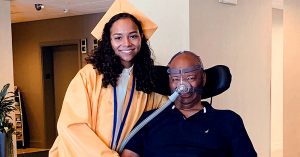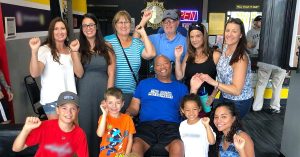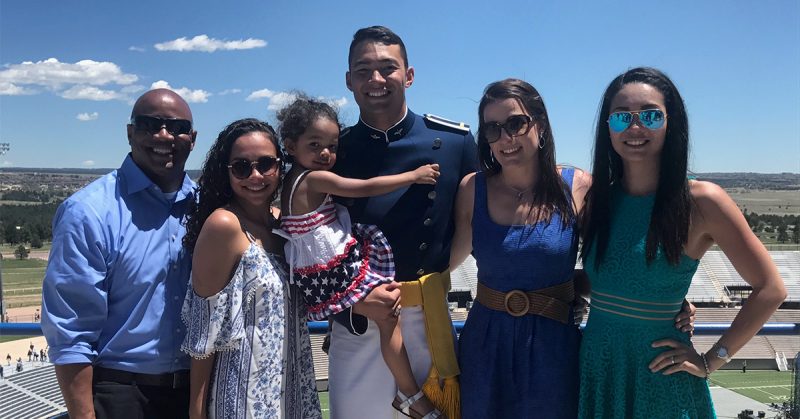My name is Karlijn Jones. I am an upcoming sophomore at the University of Maryland, College Park and I am majoring in Animal Science with a pathway in primatology conservation. I am writing today to share my experiences with grief, to hopefully explain the reality of healing and how support systems work for the individual. My hope is that with COVID-19 affecting families all over the world this article may help at least a few of them.
In 2017, my life changed when my father was diagnosed with Amyotrophic Lateral Sclerosis – also known as ALS. The world as I had come to know it was going to change completely. For those of you who do not know much about ALS, it is a progressive, fatal neurodegenerative disease; it paralyzes you, taking your ability to walk, talk, breathe and eventually to live. There is no fighting it, there is no cure and there is no hope. I suddenly had to accept that my father was going to die, and that I had to sit idly and watch it unfold.
At the time of diagnosis, my father was given up to six months to live and ended up living for two years; his battle ended in August 2019. For those two years, my family became his main caretakers – helping him with all the capabilities he had lost along the way and managing the hordes of medical equipment that came with it. Throughout the process I became fully aware of grief, loss and how to heal.
The first thing I learned: Grief is a completely personal experience. While everyone will experience loss at some point in their life, it does not look the same for everyone. People who go through a traumatic experience may feel a lot of things – or they may not feel anything. Maybe some emotions don’t make sense, and that’s okay. You are allowed to be mad, sad, hurt, relieved or whatever it is you may feel. These emotions are not a mistake. Your body and mind will handle the experience in the way it needs to. There doesn’t always have to be a clear explanation of why you feel things – or even why you feel nothing. For my family, we often used humor to get through things. At my father’s funeral, my sister-in-law and I laughed until our stomachs hurt because that’s the way my dad would have wanted it.
Even though I had two years to prepare myself for my father’s passing, the day he died, everything I had ever felt since his diagnosis hit me all at once. I won’t lie to you and say that the hurt goes away, because here I am almost a year later and it still lives in me. However, I will say you do get stronger. You learn to live with the experience. And perhaps even learn to turn it into a positive. There will come a day where you think about it a little less, and then the next day maybe not at all. That is something I personally struggled with. I had to acknowledge that moving on is normal and to not feel guilty because I didn’t cry today. I had to accept that I could be happy and that I was allowed to move on. I had to learn that it did not mean I was forgetting him. There are good days and there are bad days. It comes in waves, but the trick is learning to go with them.

You may dwell on every experience ever shared with the loved one and that’s okay too. Every laugh, every hug, every fight and every tear shared is sacred. This is how you keep them alive. Hold onto those memories, write them down if you have to – you may be surprised at all the little moments you can recall. For me, I remember every day my dad would make me hot cocoa to go with his morning coffee; a memory I had forgotten until I lost him. Now I hold that close to my heart and I think of him when I make my own morning coffee.
For those learning how to heal: don’t let anyone tell you how to feel. Don’t let them tell you to “buck up” or “move on.” You are allowed to feel stuck – you can be upset. Not a single person on this planet will understand exactly what you went through unless you decide to share with them, and even then, it’s still not the same. You are not required to share your experiences with anyone. My entire family experienced the same loss – but it was different for me than it might have been for my siblings living across the country. This isn’t to invalidate their feelings or my own, but to show that your experiences are personal to you; therefore, no one can tell you how to deal with your grief.
For the friends of those dealing with loss: all you can do is be there. No one ever really knows what to say in these situations and that’s okay. There isn’t always something to be said. The thing is some people don’t necessarily need to hear anything. Sometimes all they need is for someone to listen. Telling someone “try not to think about it” or that they should get their mind off it does the opposite of your intentions, because I promise you, they are already thinking about it. Admittedly, deciding whether to approach them or wait for them to come to you is hard. You have to really know the person and even then, it’s a shot in the dark. For me, I tried to ignore my hurt for almost two years until I suddenly couldn’t anymore. By then I called my best friend every other day just to vent – and she would just listen. I didn’t need encouraging words or a course of action. I needed someone to hear me. In a situation where I had no control, all I wanted was to be heard.
The greatest lesson I took from this experience was the message to live my dash. Well into my father’s illness, we discovered a poem by Linda Ellis called “The Dash.” It explains that when you die, on the tombstone there lies your birth date, death date and the line in between. This line represents your life. This poem is a lesson to live your life to the fullest. You never know how long or short it may be so take advantage of each day. Eventually, the money and cash doesn’t matter. They don’t define your life. Instead, your dash is measured by the love given and received, and the experiences that make you.

Soon after our discovery of the poem, my family decided to get a tattoo together: a little dash on our wrists. Then before we knew it, it had turned into a whole movement. Over 200 people have gotten the dash in remembrance of my father and the lesson of “The Dash” he tried teaching. We even have a page on Facebook, where people post pictures wearing their Dash shirts to share moments of their own dash adventures. So, go on that vacation. Ask that person out. Set a new goal. Make the most of your time here… and don’t stress on the little things. Enjoy your time with your loved ones – hold them close.
I hope that my experiences serve as some help to people going through loss, and to those who are witnesses to it. I want to wrap this up with a reminder that your feelings are valid. Not everyone has two years to prepare themselves for the loss of a loved one. But even then, it’s no easy feat. Please don’t be afraid to talk to your loved ones about how you’re feeling, and please seek professional advice if you need it. It is okay to need help.




